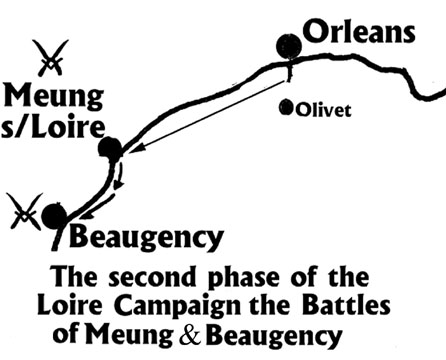
Jehanne la Pucelle
A mini-biography
(Joan the Maid, commonly called Joan of Arc in English)
Compiled from many sources by Steven R. Kanehl
Part 5
June 1429
continued
Tuesday the 14th
- Jehanne and D’Alencon leaves Orleans for Meung.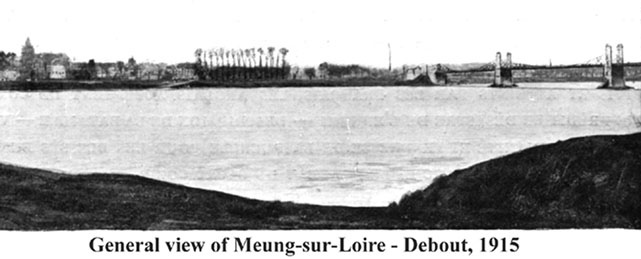
Wednesday the 15th
– An attack is made on Meung. The French easily capture the bridge. This allows them access across the river, but they bypass the lightly guarded, but heavily walled, town itself. The French leave a large garrison to guard the bridge and move on the Beaugency. Jehanne’s army has now grown to between six and seven thousand troops.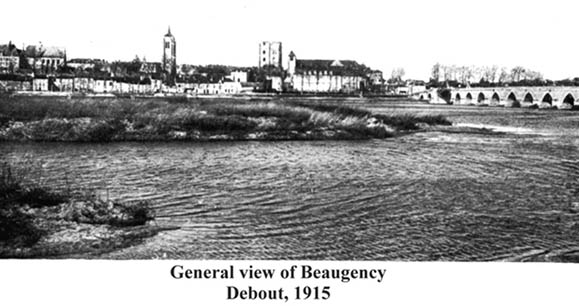
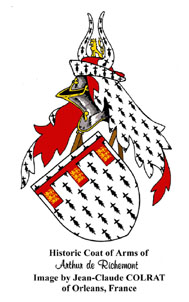 Thursday the 16th – A strange political situation confronts Jehanne as they ready an attack on Beaugency. Lord Constable Richemont arrives with some 1,200 troops. He had had a falling out with Charles over a disagreement with LaTremoille. Richemont was one of Charles most capable military leaders, and he favors a military approach to defeating the English, while La Tremoille favored diplomacy. Richemont was banned from the king’s court. Jehanne is at first unsure what to do, whether to attack Richemont or receive him as an ally. The captains tell her not to attack, but they are unsure of receiving him either. Jehanne rides out to meet Richemont. She dismounts, kneels, and embraces his knees. He makes the sign of the cross, saying to her, "Jehanne, I have been told that you want to fight me. I do not know whether you come from God or not. If you come from God, I do not fear you in any way, for God knows my good intentions; if you come from the Devil, I fear you even less." They compose their differences and all ride peaceably back to Beaugency.
Thursday the 16th – A strange political situation confronts Jehanne as they ready an attack on Beaugency. Lord Constable Richemont arrives with some 1,200 troops. He had had a falling out with Charles over a disagreement with LaTremoille. Richemont was one of Charles most capable military leaders, and he favors a military approach to defeating the English, while La Tremoille favored diplomacy. Richemont was banned from the king’s court. Jehanne is at first unsure what to do, whether to attack Richemont or receive him as an ally. The captains tell her not to attack, but they are unsure of receiving him either. Jehanne rides out to meet Richemont. She dismounts, kneels, and embraces his knees. He makes the sign of the cross, saying to her, "Jehanne, I have been told that you want to fight me. I do not know whether you come from God or not. If you come from God, I do not fear you in any way, for God knows my good intentions; if you come from the Devil, I fear you even less." They compose their differences and all ride peaceably back to Beaugency.
They attack Beaugency, a major English stronghold, lying on the Loire between Meung and Blois. Talbot, who had been in command there, had removed himself to a safer place at Janville, about 13-15 miles away (to join with Fastolf, coming from Paris). The battle rages until midnight. The French gunpowder weapons are superior to the English. The English surrender the town without the French having to scale the formidable walls. The English are allowed to withdraw to Paris on the condition that they do not fight again for ten days.
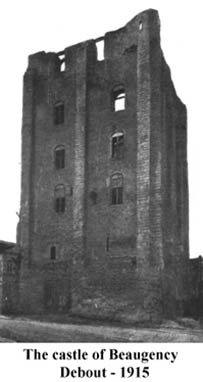
Friday the 17th
– At dawn, the English withdraw in humiliation from Beaugency on their way to Meung. Jehanne receives news that Fastolf and his 5,500 men are rapidly approaching. Jehanne says to Richemont, "Ah, good Constable. I was not responsible for your coming, but since you have come, you shall be welcome." D’Alencon is still unsure of accepting Richemont. Jehanne makes promises in writing guaranteeing Richemont’s loyalty to those who are offended by his presence. (Charles will continue to hold a grudge against Richemont, and he is not allowed to attend the coronation to be held in one month – Charles ultimately makes peace with Richemont in 1433). They encounter the English just outside of Patay in the early evening. The English send heralds to the French to challenge them. Jehanne responds, "Go and camp for today, because it is quite late. But tomorrow, at the pleasure of God and Our Lady, we will look more closely at you." The French are still nervous knowing that English reinforcements are in the field. D’Alencon consults with Jehanne. She answers loudly, "Everyone be sure to have spurs." Hearing this, the French leaders present are confused, does this mean they will retreat? Jehanne replies, "No, it is the English who will not defend themselves and who will be conquered. You will have need of good spurs as you chase after them."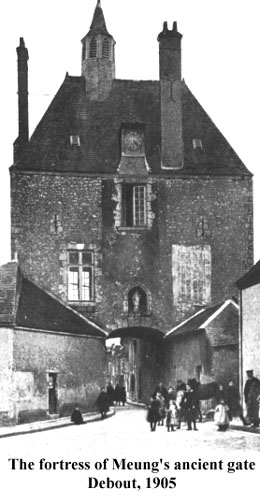
Saturday the 18th
– Fastolf makes an early morning attack at Meung in an effort to recapture the bridge. However, French troops from Beaugency have just arrived. The English have no gunpowder weapons, nor did they bring any archers to support their attack. The attack is badly organized and they, along with all the English troops, begin a retreat to Janville. Jehanne is in hot pursuit. Jehanne tells the captains, "In God’s name! We must fight them. Did they hang from clouds we should have them! For God is sending them to us for us to punish. And today our noble king will have the greatest victory he has ever had. And my counsel has told me that they will all be ours. Ride bravely, and we shall have good leading."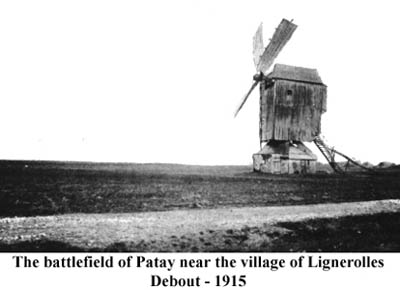
The English are about 2 miles from Patay, where they attempt to make a stand. Fastolf positions about 500 elite mounted archers between two hedges along the road the French will pass, in an attempt to ambush them. The French had some 60 to 80 lead scouts looking for the English. The scouts find the English, when a stag runs out of the woods into the English archer formation. The English, natural born hunters that they are and not knowing the French scouts are nearby, let out a loud cry. The French take advantage of this information and send a surprise cavalry attack against the English archers. The archers are quickly sent into retreat. Fastolf had not had time yet to align his remaining forces. Seeing the archers so quickly retreat, Fastolf assumes the battle is lost and all quickly retreat. Jehanne arrives with the main body of the French army. The English are in total disarray. The slaughter is already underway; the English lose almost half their army, 2,200 soldiers, while the French suffer only three killed. The battle is over by two in the afternoon. Jehanne encounters an English soldier seriously wounded in the head and left for dead. She dismounts, and while weeping, receives the Englishman’s confession, holding his head on her knees and comforting him as much as she can as he dies.
The remaining English are now shut out of the town of Janville by the town’s people, and cannot find a safe haven until they are more than half way back to Paris. Talbot is captured. He is taken to D’Alencon, Jehanne and Richemont. D’Alencon (remembering his years of English imprisonment is especially pleased) asks him, "You did not think this morning that such a thing would befall you?" Talbot responds, "It is the fortune of war."
The English have now been totally driven out of the Loire River valley. Jehanne sleeps that night at Ligneroles. Historians speculate that if Jehanne and army would have marched directly on an unprepared Paris, that they might have captured it. However, it is doubtful that Charles, ever preferring negotiations, would have allowed it. Besides, Jehanne’s primary concern now is have Charles crowned as king.
Sunday the 19th
– Jehanne and the captains return to Orleans
Wednedsay the 22nd
– The king’s council meets at Chateauneuf. Jehanne implores Charles to now march to Reims to be crowned king. Charles still hesitates, no doubt under the influence of La Tremoille.
Thursday the 23rd
– The king returns to Gien. (Gien is east of Orleans. This is significant because two months earlier this was the eastern limit of French held territory. Now that the Loire valley is conquered, Charles feels safe to venture this far east). Jehanne loses her patience and leaves Charles and encamps in a field for two days and nights. Charles is stirred to some activity, perhaps by Jehanne’s gesture, and will soon agree to go to Reims.
Friday the 24th
– The army leaves for Gien. Jehanne tells the Duke of Alencon "Have trumpets sounded and mount horse; it is time to go before the gentle dauphin Charles and put him on the road to his coronation at Reims."
Saturday the 25th
– Jehanne is at Gien. She dictates a letter to the inhabitants of Tournai and the duke of Burgundy to invite them to the anointing.
Wednesday the 29th
– The king is now on his way to Reims. Their first stop will be at Auxerre.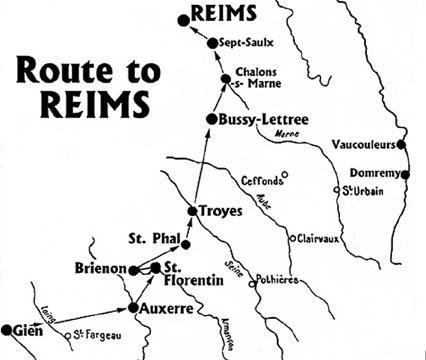
Saturday the 2nd
– Jehanne, Charles and the army arrive before Auxerre. A Burgundy garrison is housed there. Nonetheless, the city provides Jehanne, Charles and the army with food and publicly declares they would give "the king such obedience as would the cities of Troyes, Chalons and Reims." They pass on without a battle.
Sunday the 3rd
– The group is at St. Florentin.
Monday the 4th
– The group is at St. Phal. Jehanne writes a letter to the citizens of Troyes. She tells them they should have no fear for their bodies and goods if they are loyal to Charles. She promises them, that with God’s aid, they will take all the cities that should belong to His holy kingdom. They shall make a good solid peace.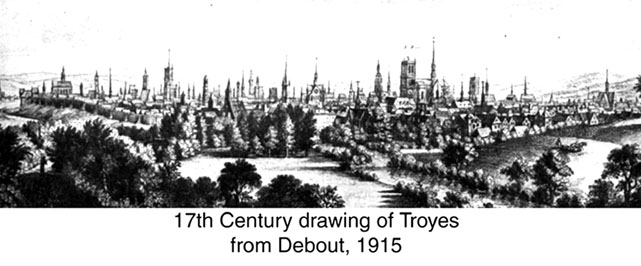
Tuesday, the 5th
– The group reaches Troyes at 9 a.m. They encounter opposition.The town refuses to recognize Charles and does not allow him to enter the town. Negotiations are undertaken for the next several days. Supplies to feed the army are running low. Providentially, there is a large supply of beans growing in fields around the town that helps feed the army. Brother Richard (a well-known travelling evangelist of the day) was in Troyes. He had previously preached there and urged the people to sow good seed (spiritually speaking), but the people were so caught up with his preaching that they literally sowed bean seeds.
After a few days of negotiations with no results, the frustrated Charles and the army captains finally summon Jehanne for her advice. She said "Noble dauphin, command your people to come and besiege the city of Troyes, and do not waste more time in long councils, for in God’s name, within three days I shall lead you into the city of Troyes, by love or by force and either way with courage: Burgundy will be stupefied by it." The Archbishop of Reims said they could wait up to six days if necessary, but wondered if Jehanne was sure. She said she was sure.
During the next two days Jehanne gives orders to make preparations for an attack. They make scaling ladders, position the artillery, and make bundles of sticks to fill the ditches. She makes such good decisions about the placement of the artillery that even the military men are astonished.
Sunday, the 10th
– The townspeople awaken to see the French army in full array, ready for battle. Jehanne is at the head. She gives the signal and the men move forward to put the wood into the moat to make a bridge. The trumpeter is at Jehanne’s side, ready at her command, to signal the attack. The town is thrown into a panic at this sight. They send out Brother Richard to negotiate. He approaches Jehanne, making the sign of the cross and sprinkling holy water (as he is unsure if she is a witch). She says to him "Approach boldly. I shall not fly away (witches were supposedly able to levitate)." The town will acknowledge submission to Charles. Charles enters Troyes with great ceremony, and Jehanne carries her banner near him. Many people report seeing thousands of white butterflies flying around her banner. Jehanne agrees to be a godmother to a baby born in the town that day.
Tuesday, the 12th
– The group leaves for Chalons.
Wednesday, the 13th
– The group encamp near Mailly.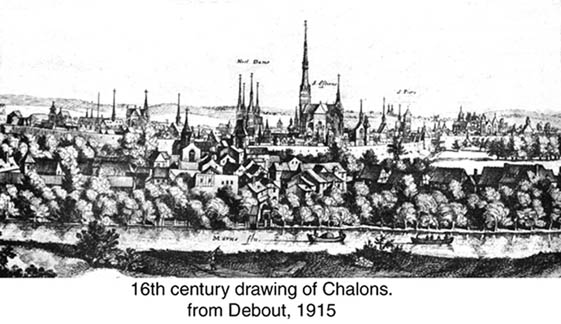
Thursday, the 14th
– At Chalons, Jehanne meets friends from Domremy. She meets Jean Morel, one of her godfathers. She gives him her patched red dress to return to her family. Gerardin d’Epinal states that Jehanne told him that she feared nothing but treason. The group is but 30 miles from Reims. The group encamps near Bussy-Lettree.
Friday, the 15th
– The group is at the castle Sept-Saulx.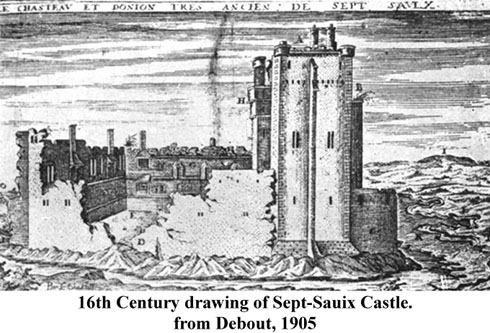
Saturday, the 16th
– At the castle, Charles receives representatives of Reims, who offer him full and complete obedience. Some renegade Frenchmen, who had collaborated with the English, quickly leave the city. This group includes Pierre Cauchon. The group enters Reims near evening. Preparations are made all through the night to ready the cathedral for the coronation. Jehanne sees her father. He is lodged at the Ane Raye (since replaced by the Maison Rouge). The King gives Jehanne sixty livres tournois as a present for her father. Jehanne is so wildly popular that she cannot openly ride in the streets, so a meeting has to arranged.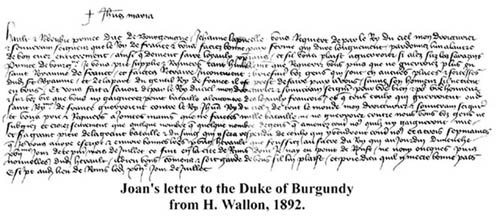
Sunday, the 17th
– Early in the morning, Jehanne writes a letter to Philip the Good, Duke of Burgundy, to make a firm and lasting peace with Charles. She urges them to pardon each other with sincere hearts, as loyal Christians should. She urges Philip to no longer make war on the holy kingdom of France. She tells him that the King of Heaven has told her that those who battle against France are warring against King Jesus, her rightful and sovereign Lord.
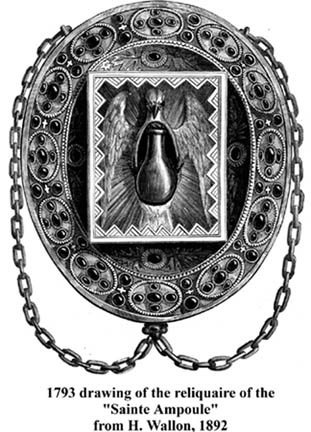
Charles had entered the cathedral at 3 in the morning to begin the traditional prayer vigil prior to being knighted. The ceremonies start at 9 in the morning. Jehanne enters the cathedral as part of the procession, her armor covered with a tunic of white silk. She is the only female in the procession, the only one neither clerical nor noble and the youngest of them all. Charles VII is crowned king of France and anointed with the holy oil by the archbishop of Reims. The Duke of Alencon knights the King, the seigneur d’Albret holds the sword. Jehanne stands by Charles side, in her armor, and carrying her banner. As the crown is placed on his head, the crowd shouts out "Noel". Jehanne falls to her knees before him, weeping with emotion. Jehanne tells Charles, "Gentle king, from this moment the pleasure of God is executed. He wished me to raise the siege of Orleans and bring you to the city of Reims to receive your anointing, which shows that you are the true king and the one to whom the kingdom should belong."
The cathedral had its foundation stone laid in 1212. Much had been completed by 1381, when worked stopped (probably due to the war). It was resumed in 1427. Only two spires on each of the towers flanking the great west door remained to be added (they never were). Unfortunately, the cathedral was destroyed in a World War I bombardment, but has since been restored.